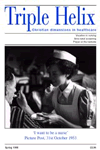This book tackles from a Christian perspective a number of the ethical issues raised by the rapid developments in human genetics. It confronts most of the common problems but does not address recent controversies such as the debate over cloning whole animals (and potentially humans?) nor the questions surrounding genetically engineered foods.
Different emphases are applied by different authors. Dyck for example states that 'one of the major ways in which the concerns of negative eugenics were and are being pursued is through centres for genetic counselling'. The quality genetic counselling described later in the book by Thompson paints a wholly different picture and Anderson states 'genetic counsellors are playing a central role in limiting the reductionism that might otherwise occur and are in a good position to interpret test results back to the individual and wider family'.
Francis Collins portrays the potential medical benefits of the Human Genome Project, whereas Verhey asks 'should we allocate so many resources to the Human Genome Project when we do not have the resources for the poor or the homeless?'
Walters discusses research into the genetic basis of personality traits, IQ, and violent and aggressive behaviour without really questioning its validity or any inherent dangers in these studies. He sees germ-line gene therapy as acceptable providing scientists can repair or replace the faulty gene, not simply adding a good gene whilst leaving the faulty one in place.
Hook provides a well-balanced review of genetic testing and deals with the issue of confidentiality in relation to other family members including potential spouses, employers, insurers, etc. He argues that confidentiality without exceptions poses ethical problems, commenting that some patients withhold information from relatives for sinful reasons, and that failure to disclose may sometimes endanger life.
Rae is a strong advocate for the rights of the genetically handicapped fetus and argues persuasively against the assumption of abortion if prenatal diagnosis reveals an abnormality. He opposes pre-implantation diagnosis as this results in the discarding of abnormal embryos.
Four chapters are devoted to genetic intervention, largely considering the ethics of gene therapy to enhance normal parameters such as height or intelligence, should such things ever become possible. There would undoubtedly be a market for this as conventional therapies are already used for this purpose, eg growth hormone treatment in non-GH deficient short stature. What approach should be taken? If we can do it, ought we? Sherry argues, in a chapter on patenting laws, that the commercial incentives driving biotechnology research could accelerate developments that are ethically questionable.
How should the church respond? Mitchell urges celebration for some developments, caution that genetic reductionism may result, and outright resistance to other possible outcomes including widespread pre-natal screening (if this becomes possible) and gene-based discrimination.
This American book makes a thoughtful and stimulating read. Because of the variety of views expressed within it, it is important to read the whole book to obtain a full perspective despite the temptation to dip in to certain chapters that capture the imagination. The personal experiences of some families faced with genetic disease which are presented in the introduction are helpful in setting what follows in context.
Reviewed by
Alan Fryer
(Clinical Geneticist, Liverpool)































